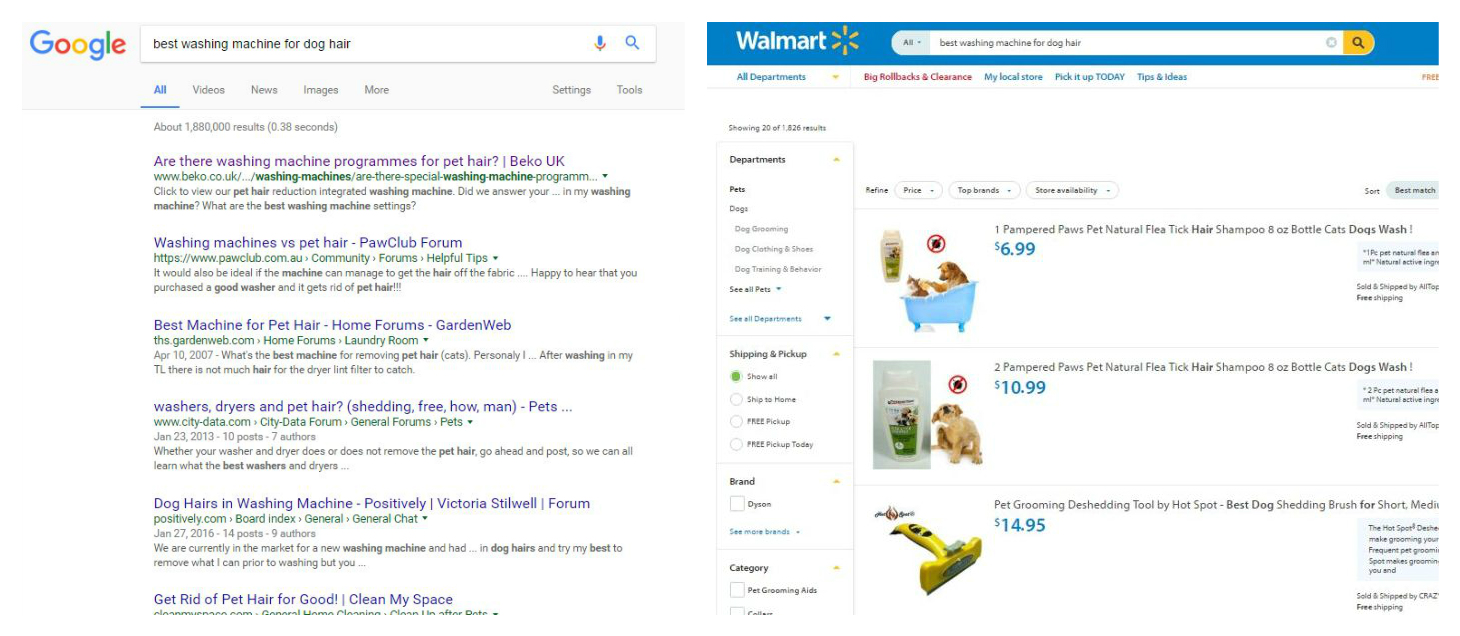The rising costs of online advertising combined with the shopper expectation of personalization is forcing marketers to be more sophisticated in their targeting.
With the aim of improving performance, many marketers opt for granularity with their media buying, such as localisation (e.g. country, state) and qualifying terms (e.g. colour, size, model). This can have the intended effect of bringing in more quality leads and reducing CPC. More importantly, though, it brings the online shopping experience closer to an instore one where shoppers can ask an assistant for advice on products who in turn can offer valuable suggestions based on their needs.
However, for anyone that has typed a product request in Google or on an e-commerce website, the result can be very frustrating. Anything other than a simple request will bring up unrelated or unhelpful information or suggestions
To prove this point, we searched for “best washing machine for pet hair”, a request that millions of pet owners might be interested in. In Google, not one transactional (e-commerce site or product) suggestion was offered up on the first page. Similarly, Walmart did not offer a washing machine in their first 25 pages of products.
Intent-based marketing 2.0
When it comes to improving engagement, marketers and e-commerce sites are clearly nowhere close to the instore experience of matching content with shopper intent. This could be because search marketers simply don’t know “the best washing machine for pet hair”.
Artificial Intelligence (AI) technologies that are new to the market could now provide marketers with a whole arsenal of tools to solve this challenge.
Advances in natural language processing and machine learning now allow us to analyse massive volumes of consumer opinions from across the web. Making use of not just customer reviews, marketers can also tap into the millions of social media posts, forum conversations, YouTube comments etc. that are written every day online. AI enables marketers and retailers alike to understand not only the context and emotion of a large number of opinions but also analyse these opinions for specific aspects.
It is this information that allows marketers to optimise for intent and massively improve online marketing conversion rates.
At long last, intent-based marketing can live up to its potential and address the “intent” aspect of product marketing.
Applying this technology to different types of products, we discovered intent-based nuggets that could prove invaluable to search marketers. For example, according to consumer opinion:
- Travellers to Las Vegas had strong opinions about the water pressure in their hotels, with The Bellagio and Four Seasons hotel ranking highly for this aspect.
- Parents buying booster seats were interested in the ones that were “best for installation” with Graco and Recaro-brand seats scoring well for installation.
- When considering printers, the speed was an important aspect that was considered. Certain printers made by HP and Epson were considered to be good for this feature.
The rise of voice-activated personal assistants (Cortana, Siri, Alexa), has also placed further emphasis on transactional queries with shoppers navigating by intent-based requests. As shoppers become more comfortable asking machines longer tail questions, the responses and recommendations being provided need to be similarly intuitive.
Go beyond basic keyword search
Marketers with the goal of improving ROI on transactional or commercial queries can use Artificial Intelligence to harvest a gold mine of crowd-sourced opinion.
As you can see from the table above, buying intent-based keywords can dramatically reduce marketing costs. During our tests, we found PPC costs fall by around 35%.
Reducing PPC costs is one thing, increasing conversion rates is probably even more of an important metric for online marketers. Here too, the use of intent-based keywords had a dramatic effect. Our tests showed approximately one third of clicks to landing pages using longer, intent keywords, proceeded to click “add to basket”, a significant increase on accepted industry averages.
Artificial Intelligence is very much a hot topic right now and much has been written about the application of this evolving technology in areas such as self-driving cars, medical research or finance. In 2017, it will be the marketers that embrace the potential of AI in digital marketing that could see the best returns, maximise traffic & conversions and achieve their overall marketing goals.



